There are times I’ve watched a film (like Daag, or Pyaar ka Mausam, or Taqdeer) and got the distinct feeling that the music director composed one especially good tune in the film, and that was a fact acknowledged by the film maker too, who decided to use that tune in different versions throughout the film. Therefore we have Ae mere dil kahin aur chal in several versions, and the same with Tum bin jaaoon kahaan or Jab-jab bahaar aayi aur phool muskuraaye. The tune, at least in essence is the same (the tempo may change); the singer(s) may be different, the actors who lip-sync to it may be different, and there may be other differences as well.
‘Multiple version’ songs can be of different types. The most common (from what I can tell; I haven’t researched this) is the differentiation of tone: the happy version/sad version scenario. One version of the song (usually the one that appears earlier in the film) is an upbeat, happy one; the other uses the same tune, but often different lyrics that reflect two different situations.
Then there are songs where different versions may be only sung by different playback singers—which might include (as in the case of Jab-jab bahaar aayi) one version sung as a solo, another as a duet or even by a trio. There are also versions (overlapping with regional language cinema) where the same tune is used in songs in films of different languages, for instance the Bengali song Ei raat tomaar aamaar (from Deep Jwele Jaai) appears as the lovely Yeh nayan dare-dare in the Hindi film Kohraa.
Those are versions for other, later song lists. For this post, I’m going to confine myself to one particular type of ‘multiple version’ song: the solo male singer/female singer song.
Songs which appear in at least two versions in the same film, at least once sung by a male playback singer and another time (at least once) by a female playback singer. Among the other criteria I’ve used as standards for the songs on this list:
- The tone of the song doesn’t matter. It could be happy in both versions, sad in both versions, or two different tones.
- In both versions, it should be a full-fledged song, at least the refrain and one stanza (which is why one favourite of mine—Yoon toh humne laakh haseen dekhe hain—does not make the cut, since the female version is just a couple of lines).
- Both songs should be solos. Not one song a solo and the other a duet (not even technically a duet; the Lata version of Waadiyaan mera daaman, for example, begins with one line sung by Rafi; similarly, the Rafi version of Teri aankhon ke siva duniya mein rakha kya hai has one line sung by Lata at the end, so neither of these songs qualifies. Neither does the Lata version of the beautiful O mere shahekhubaan, since it is begins with one line in Rafi’s voice).
As always, these songs are all from pre-1970s Hindi films that I’ve seen (with one exception, from a film on the cusp), and are in no particular order.
1. Aji roothkar ab kahaan jaaiyega/Aji humse bachkar kahaan jaaiyega (Aarzoo, 1965): One interesting thing I came across while researching the songs for this post: most double-version male/female solos appear in films in a specific sequence. The male is picturized first, singing the song; the female version follows later in the story—mostly when the leading lady has been separated from her lover and remembers him through a song he’d sung.
Aji roothkar ab kahaan jaaiyega is one of the exceptions. Rajendra Kumar’s character here plays second fiddle to his lady (Sadhana). She sings the song first, at a party where he is invited and she (this being a party, after all) is begged by everybody to sing a song. Her song is Aji roothkar ab kahaan jaaiyega—ostensibly to soothe her mock-annoyed uncle, but actually directed at her lover. He gets a chance to sing the song to her when trying to stop her from leaving after a date: but since she’s not huffy, he’s not coaxing her. He’s simply daring her to leave: because he will be there, wherever she goes. Aji humse bachkar ab kahaan jaaiyega.
2. Sab kuchh lutaake hosh mein aaye (Ek Saal, 1957): A man takes on the job of bringing happiness and love into the life of a beautiful heiress who only has a year to live—except that he’s doing so for purely mercenary reasons; it’s all a pretence, he’s doing it for money. But somewhere down the line, his conscience awakes. And sings this song: a song jolting him into a realization of just how he’s betraying the woman he’s fallen in love with.
… and, what better proof of the deep connection between these two characters than that, near the end of this film, the woman (Madhubala) is able to sing the same song which her lover’s conscience sang to him? The words are different, and so is the emotion: his was the guilty conscience speaking, hers is the heartbroken cry of the betrayed.
In most cases of double versions of the male and female type, I end up liking one version better. In this case, I cannot choose between Talat’s version and Lata’s: both are sublime.
3. Ehsaan tera hoga mujhpar (Junglee, 1961): From one of my favourite films comes this emotional, poignant love song which pleads with the beloved to bestow a favour on the singer: let me stay close, do not push me away. Shammi Kapoor’s character, in Rafi’s voice, sings the song first, wooing back the sweetheart (Saira Banu) who is upset at the way his overbearing mother has pushed her away as being unworthy of her son. The strains and stresses that plague this relationship resurface in the man’s dreams later—and the song resurfaces. This time, his beloved appears in his dreams, begging him (in Lata’s voice) to stay with her.
4. Dil jo na keh saka (Bheegi Raat, 1965): Like Sadhana’s character in Aarzoo, Meena Kumari’s character in Bheegi Raat is the one to first sing a song. And she’s far more daring than Sadhana’s character. Here, on the bheegi raat (‘wet night’, which sounds far more risqué than the Hindi equivalent) in question, the two lovers are caught in a storm and—in typical Hindi film style—It’s the woman who gets drenched and has to exchange her soaked clothing for a sheet. Against a backdrop of sensual carvings, she sings this come-hither song to her (perfectly dry) lover.
And, much later, when misunderstandings galore have wreaked havoc with their lives, the lover sings it back—this time, in a public space, using the song to taunt her for her (perceived) infidelity. The words of the two versions differ, hers being all about romance, his being all about her faithlessness.
5. Jeevan ke safar mein raahi (Munimji, 1955): This is one of those double-version songs where one version is far more popular than the other one (and, as is usually the case—for instance, as in Waadiyaan mera daaman or Ehsaan tera hoga or Dil jo na keh saka—it’s the male version that’s more well-known). The first time Jeevan ke safar mein raahi appears in Munimji, it’s when Nalini Jaywant’s character finds herself and her car hijacked by a daredevil and utterly incorrigible passerby (Dev Anand), who after irritating her with his wild ways, bursts into song to entertain her, and ends up charming her in the process.
Much later, after she has discovered the secret identity this man hides, and the pain that entails, she sings the song back to him. A sad song, also sung in the car. Also when it’s just the two of them on a lonely road. But how circumstances have changed, and how everything has unravelled…
6. Khilte hain gul yahaan (Sharmeelee, 1971): Sharmeelee is one of those films that was released in the 70s—in 1971, to be precise—but has an unmistakably 60s air to it. Its music (SD Burman, superb as always) is great, and this one, probably the most popular of its songs, appears in two versions.
The first time Khilte hain gul yahaan occurs is when Shashi Kapoor’s character, an Army officer, meets the effervescent Kamini (Rakhi) in Kashmir. Immediately besotted, he sings this love song—and then, over the roller-coaster ride that their lives become, ends up separated from Kamini and married to her twin sister Kanchan. Kanchan, seeing the plight of her husband—who hates her and becomes suicidal—decides to pretend to be Kamini in an attempt to bring him back from the brink: and she does that by singing Khilte hain gul yahaan, to start with.
7. Dil lagaakar hum yeh samjhe (Zindagi aur Maut, 1965): Zindagi aur Maut was a fairly typical NA Ansari film: frenetically paced, over the top and an extremely convoluted spy film where the only impression I was left with at the end was of utter confusion—and some lovely songs. C Ramachandra composed the music for Zindagi aur Maut, and the beautiful Dil lagaakar hum yeh samjhe was the jewel in the crown when it came to this film. And, befittingly, it appeared twice in the film, the first time sung by Mahendra Kapoor for Pradeep Kumar’s character when he’s wooing his lady love (Faryal). Later, when (as is usual), things have fallen apart, she sings it (in Asha Bhonsle’s voice)—this time bemoaning the faithlessness of her lover.
8. Mujhko is raat ki tanhaayi mein (Dil Tera Hum Bhi Tere, 1960): Pretty much all multiple version songs have one song in a happy and upbeat mood. The other may or may not be happy (some are, though they’re rare). Even rarer is the multiple version song where both versions are depressing and unhappy. From one of Dharmendra’s earliest films is this aching song of lovers separated and missing each other. Both songs occur within the last half hour of Dil Bhi Tera Hum Bhi Tere. First Dharmendra’s character, separated from the girl (Kumkum) whom he loves, sings of his woe and how much he’s missing her (this is one of my favourite Mukesh songs). Then, just before the happy end, Kumkum’s character, disabled and therefore distancing herself from her beloved (she doesn’t want to be a ‘burden’ on him) sings it too.
9. Jiya o jiya o jiya kuchh bol do (Jab Pyaar Kisise Hota Hai, 1961): Dev Anand seems to have acted in several films which featured multiple version songs (and I’ve not even included Ae dil kahaan teri manzil, Tum toh dil ke taar chhedkar, Abhi na jaao chhodkar, and Na tum humein jaano in this list). This is one double version song that pretty much exemplifies this type of song. The male version (sung by Rafi) occurs close to the beginning of the film: Dev Anand’s character, in almost Shammi Kapoor-madcap style starts singing while riding atop a car, addressing his song to the girl (Asha Parekh) in the train alongside, and livens things up by eventually jumping on to the train.
Later in the film, long after the two have fallen in love, they fall apart, their relationship riven by misunderstandings. Misunderstandings mostly on the part of the woman, who—when she realizes how wrong she was—uses the same song to say sorry and coax him back. Interestingly, the fast pace of the song doesn’t change even in the female version, though Lata does introduce a note of near-despair in it, reflecting the character’s desperation.
10. Aa lautke aaja mere meet (Rani Rupmati, 1957): And, to end, a song from a film which was a veritable parade of great songs. Rani Rupmati may have been somewhat dodgy on the historicity front, but when it came to music, SN Tripathi (who also directed the film) gave this film some really fine classical-based songs. Of all the songs of Rani Rupmati, possibly the most popular of them all is this one, sung in two versions: one by Mukesh (for Bharat Bhushan) and the other by Lata (for Nirupa Roy). A song of yearning for the beloved, telling them that without their presence, the singer’s music has gone flat and dull and lonely… if this is what eroded music sounds like, I wonder what music at a perfect pitch would be.
Which are your favourite songs that fit these criteria?




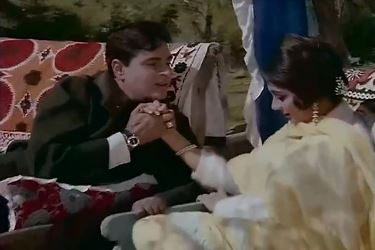


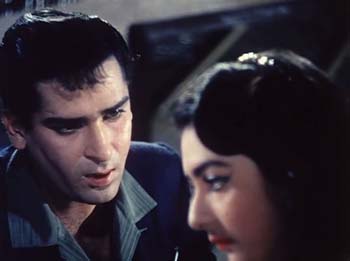
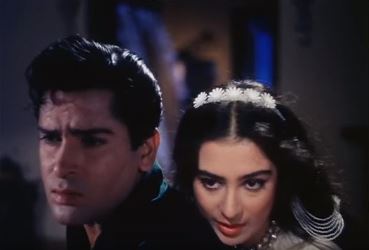
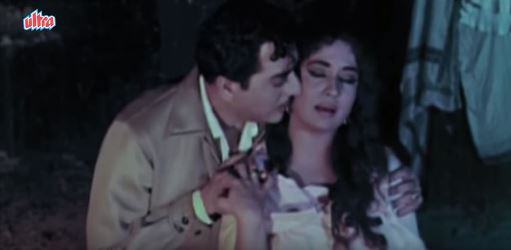

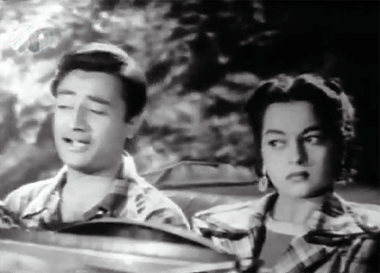
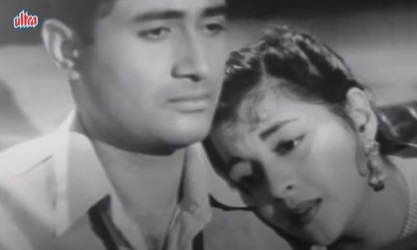

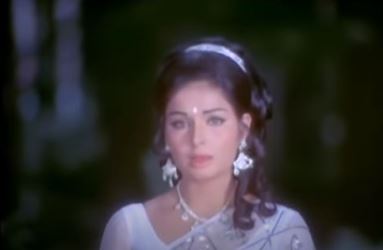
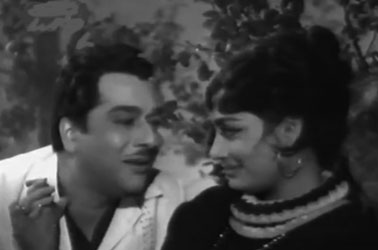

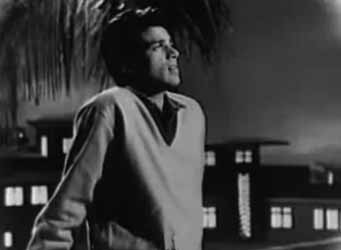
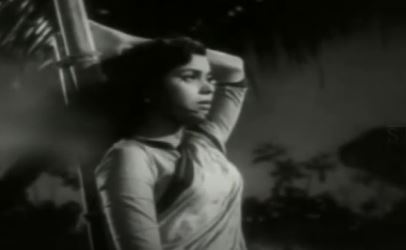
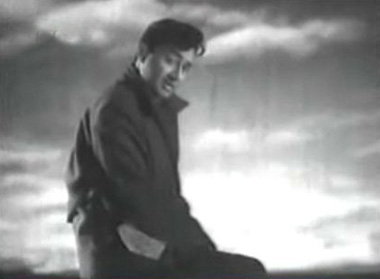
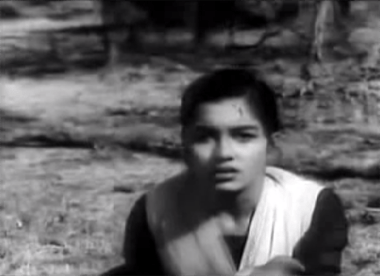

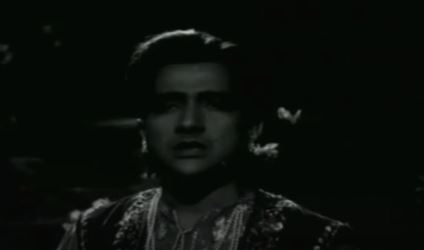
Do these qualify – Ishara: Dil beqarar sa hai, Rani Rupmati’s ud jaa bhanwar and aaja bhanwar?
LikeLike
Oh, yes. Dil beqaraar sa hai is a perfect fit. Lovely song too.
Ud jaa bhanwar and Aaja bhanwar have completely different tunes, I think… they’re back to back songs, but not two different versions of the same song.
LikeLike
In the beginning, you’ve mentioned “The Rafi version of Teri aankhon ke siva duniya mein rakha kya hai has one line sung by Asha at the end”, I think you’re referring to Asha Bhosle (presuming Sunil Dutt : Asha Parekh; Mohd. Rafi : Asha Bhosle) but those lines were actually sung by Lata Mangeshkar.
LikeLike
Sorry, that was my mistake. Have corrected it now. Thanks for pointing it out.
LikeLike
Found a beautiful song that might fit the criteria of this post. The lyrics are different but both these songs are from the same film and are set to a similar tune.
and
LikeLike
I don’t think I’ve ever come across Teri zulfon se pyaar kaun kare/Subaah ka intezaar kaun kare. Beautiful song(s), thank you for these.
LikeLike
What a lovely idea for a list! You’ve already mentioned some of my favourites such as Aji Roothkar, Ehsaan Tera and Dil Jo Na Keh Saka. Some others that I think fit the bill and are personal favourites too –
1. Tum Mujhe Yun Bhula Na Paoge
2. Sajan Sajan Pukaroon Galiyon Mein
3. Mere Mehboob Tujhe Meri Mohabbat Ki Kasam
4. Gar Tum Bhula Na Doge
I’ve only posted one version of each song but interestingly all of them are one Rafi solo and one Lata solo version of the same song – my two favourite singers!
LikeLike
I’m so glad you enjoyed this post! Thank you so much. Of the songs you’ve mentioned, Mere mehboon tujhe meri mohabbat ki kasam and Tum mujhe yoon bhula na paaoge were both on my shortlist, so I’m especially glad to see these two. The other two are nice songs too.
LikeLike
Lovely list, Madhu. So many of my favourites in this, especially Ehsaan tera hoga, Jiya o jiya, Sab kuch lutaake hosh mein aa, Dil jo na keh saka, Mujhko is raat ki tanhaayi mein. Of course, I like one version better than the other in most of these songs.
One of my favourites, Mera qaraar le jaa sung by both Talat and Lata, separately from Aashiaana wouldn’t fit your criteria because the Lata version has a small alaap in the beginning by Talat. Neither does my favourite – Ye raat ye chandni phir kahan the female solo actually begins with the reprise of the antara sung by Hemant Kumar.
But another Talat/Lata separate solo, Ae mere zindagi from Adl-e-Jehangir may qualify.
C Ramchandra and Lata do separate honors here: Dheere se aaja ri akhiyan mein from Albela
One more – the last, I promise. :)
Humein tumse pyaar kitna from Kudrat – two separte solos by Kishore Kumar and Parveen Sultana
LikeLike
Anu, I’m so glad you liked this list! As I was compiling it, I thought: these songs are all the usual suspects, aren’t they? Nothing there that nobody would say of that it was new to them. But the good thing about a list like that is at least the songs are popular ones – and, possibly popular because they’re good? :-)
I didn’t at first recall the Adl-e-Jahangir song, but remembered having heard it once it started playing. Dheere se aaja was on my shortlist, so I’m glad to see it here.
LikeLike
Sorry to butt in, but dheere se aaja is a female solo and a duet version.
By Chitalkar and Lata Mangeshkar.
LikeLike
Ah. This is what happens when you think you know a song and therefore don’t bother to listen to it again. ;-) Thank you for pointing that out.
LikeLike
Good morning!
What a refreshing start you offered for this Sunday! A great song list, I must say.
Solo versions of the same song.
Would you consider ‘Tum bin jaaoon kahan’.
Rafi and Kishore Kumar solos appearing strep different occasions in the film?
Off hand, I can remember
Duniya banane wale from Teesari Kasam
Mukesh and Suman Kalyanpur versions.
Suman version just manages to fit the bill.
Starts with stanza and ends with mukhda.
Let me find the video, I’ve seen it once, so it’s there
Here it is,
What else! I’ll be back later. Going to buy vegetables. With mask and social distancing of course.
So in a hurry.
:-)
LikeLike
I noticed that you had commented later about Tum bin jaaoon kahaan, so I will not react to that. ;-)
I had completely forgotten that there was a female version of Duniya banaanewaale! Thank you for that.
Glad you liked this post, Anupji.
LikeLike
Oh my God!
How can I ask about Tum bin jaaoon kahan? It’s a male or female version list.
Really sorry about that!
How embarrassing!
🙈
🤐
LikeLike
No problem. :-) We all blunder now and then.
LikeLike
Waiting for my turn in the queue. Thankfully we get the Bhajiwala in our society itself. So don’t need to travel outside.
Anyways,
Remembered a pair of songs.
Agar Bewafa Tujhko pehchan jate
By Lata Mangeshkar and Rafi separately
Music and lyrics by Prem Dhawan
Sonia sahani in Lata’s voice
And
Rafi’s solo
Prem Dhawan wrote different verses for both the versions. The movie, Raat Ke Andhere Mein would be b grade obscure movie. Nevertheless the song is good.
:-)
LikeLike
It’s been a long time since I heard this song! Like a blast from the past. And I’ve never seen the video before.
LikeLike
Oh!
One more,
From Thokar by Sardar Malik if I remember correctly.
Ae Gham e Dil Kya Karoon
By talat
And
By Asha Bhosle
LikeLike
This is such a coincidence. Yesterday, once this post was complete, for no reason that I could understand, Ae gham-e-dil kya karoon kep coming to my mind. I have no idea why! I had no idea this one also an Asha version – I only knew the Talat version, which is so beautiful. :-)
LikeLike
Excellent compilation that have passed many filters you have set. Generally in each of your posts, there is one “Baap of the Category or Mother of the Category”. This time however all of them are “category leaders”. My person favourite though is “Ehsaan Tera Hoga” being a Rafi saab fan.
LikeLike
I am so glad you liked this post! Thank you very much.
LikeLike
One more,
I’m Back home.
Akele Hai chale Aao
By Lata Mangeshkar
And
Rafi
LikeLike
Oh, yes. This song was on my shortlist, but it got outstripped by others. Still a nice song, though.
LikeLike
You have already included screenshots of hum ne tumko pyar kiya Hai.
So I won’t add it.
There was an unreleased film called Black Prince, songs composed by Dulal Sen.
It had Nigahen Na Phero by Rafi and Suman kalyanpur solos.
Rafi version
Suman version
My personal favorite is Rafi’s version.
It’s a good song though from a b grade film possibly.
LikeLike
Thank you for this. I had never even heard of Black Prince before. Yes, sounds definitely like a B-grade film. Dara Singh type. ;-) But nice song.
LikeLike
Multiple version songs were made in a different way in post 60’s era. Two categories i like to mention here. Furstly, A person used to sing a song in his/her childhood for his/her love interest or family members. Then they were separated due to irony of fate. After many years (usually two decades) that particular song played a key role to reunite them. For example: 1) “phoolon ka taaron ka” from “hare rama hare krishna”. 2) “yaadon ki baraat” from “yaadon ki baraat ” 3) “o saathi re” from “muqaddar ka sikandar” The second category is almost same as the first. But here “two decades” are replaced by “one lifetime”. Yes, those are reincarnation movies. For example: 1) “mere naina sawan bhaadon” from “mehbooba”. 2) “hamein tumse pyar kitna” from “kudrat”. Thank you for another innovative post.
LikeLike
Thank you for that insightful comment! Yes, absolutely true about the two decades/one lifetime difference between the double version songs you mention. I can’t think of too many films from the 50s and 60s which had a reincarnation theme – at least not enough to be able to do a post of ten good songs that fit the criterion, but it might be a fun challenge to try and come up with the ‘two decades gap’ type of song. I will try and see if that is possible.
LikeLike
Great suggestion. Was wondering if Jyot se jyot jalate chalo count? I remember there are 2 versions of the song, by Mukesh and by Lata. Probably sung by the central character once as a child and later as an adult.
LikeLike
Yes, I do recall that there are two versions of that song, though – since the movie doesn’t seem to be available online, and I’ve never seen it – I can’t tell if it’s supposed to be the same character. But I can think of several other songs which fit the bill very well.
LikeLike
Very brief , but Sushma Shresth sings this version of Ik Din Bik Jayega from Dharam Karam
As does Mukesh of course
And this song has been sung by Kishore Kumar and Asha Bhonsle as well..
LikeLike
That should be a song/songs for a separate post! Not in the same film, but across films. I had totally forgotten that Ik din bik jaayega appeared in Dharam Karam too. Or that Kishore and Asha sang it too.
Yikes, I’m coming across as severely ill-informed. :-(
LikeLike
Mere Mehboob of course has two versions, neither version plagued by any change of circumstances… the female version just recapturing for her friends what was sung by the poet in another public gathering
And here of course the male version by Rafi Sa’ab
LikeLike
I can imagine you not using this sing DO…its a bit whiny no :)
LikeLike
LOL! No, it’s not too whiny to be left out. Just that there were other songs that I liked more.
LikeLike
Lovely list, Madhu. Visiting your blog after ages! :-)
The four songs that came to my mind the moment I saw the heading of your post on FB are very much there – yay! Ehsaan tera hoga mujh par, Jiya o Jiya, Dil lagakar hum yeh samjhe and Khilte hain gul yahan :-)
Two songs I would have included (probably mentioned in the earlier comments) are Mere mehboob tujhe meri mohabbat ki kasam and Gar tum bhula na doge.
LikeLike
So happy to ‘see’ you here again, Harini! Glad you found some old favourites here. :-)
I’ve been wondering how I completely forgot Gar tum bhula na doge! I should have remembered that one.
LikeLike
Hi Madhuji, a few additions from my memory.
1. Meri mohabbat jawaan rahi hai (Jaanwar, 1965)
2. Meri jaan tum pe sadke ehsaan (Sawan ki Ghata, 1966)
3. Chura lena tumko ye mausam suhana (Dil hi to hai, 1963). I believe there was a sad version with different lyrics by Suman Kalyanpur which did not make it to the movie. The audio version is available.
4. Taqdeer ka fasana (Sehra, 1963)
5. Nagma-o-sher ki/ Rang aur noor ki…kise pesh karoon (Ghazal, 1964)
LikeLike
Does the ‘ JANWAR ‘ song ‘ meri muhabbat jawaan rahegi ‘ has a female version ? I don’t think so.
LikeLike
Thank you, GG. Some great suggestions there. Though, as Bhagwan Thavraniji also points out, I don’t think there’s a female version of Meri mohabbat jawaan rahegi. Unless it was there originally in the film when it was screened and has since disappeared from the digital versions.
LikeLike
Also, isn’t Chura le na tumko from Dil hi toh hai, a duet as well?
LikeLike
Yes. I had forgotten that.
LikeLike
There is also Humein aur jeene ki chahat na hoti from Agar Tum Na Home
Female version
And the Male version
LikeLike
Yes. Nice song. :-)
LikeLike
And like Rajendra Kumar and Sadhana , Rajesh Khanna seems to have a fair share of such songs..especially later in his career
Zindagi payer ka geet hai from Souten
LikeLike
And let me add one more to that. From Andaz, Zindagi ek safar hai suhaana, sung by Kishore:
And by Asha:
(Of course, there’s a duet as well, with Kishore and Rafi) – but I’ll leave that for another post.
LikeLike
But of course, Rimjhim Gire Saawan from Manzil
In Lata ji’s voice :
And in Kishore Kumar’s Voice:
LikeLike
An old favourite. What a very monsoony song this one is. Thank you!
LikeLike
Dear Madhu,
Thank you so much for a delightful theme….multiple versions of much loved songs….to lift one out of any sense of despondency in these troubled times.
And thank you, “ak” for beating me to listing the all-time favourite:
“Rim Jhim Gire Saawan” from Basu Chatterji’s “Manzil”.
My “vested interest” – Cinematographer K K Mahajan, who worked extensively with Basu Chatterji ( among others) on some of the memorable films of the 70s, and 80s, and after….
Some interesting info ( not quite trivia to follow in a later post…..)
Was trying to send it out now…but inexplicably..it disappeared into the ether!.
For now, giving the links, once more, with feeling…
——————————————————
Praba Mahajan
LikeLike
Thank you Madhu, for such a beautiful theme!
Multiple versions of much loved songs….to lift the sense of despondency in these unprecedented , difficult times.
And thank you, “ak’ for your post listing both versions of
“Rim Jhim Gire Saawan” from Basu Chatterji’s “MANZIL”.
I was trying to send out a post on this much- loved rain song, but inexplicably it disappeared into the ether……!.
I have a vested interest which I must admit to….
My husband, cinematographer K K Mahajan worked on many films with Basu Chatterji ( among others) , “MANZIL” being one of the early ones.
The film has been long forgotten ( did not quite work at the box-office, when released….) but both versions of the song continue to be popular, the one by Lata Mangeshkar for the visualisation of a rain-swept Bombay of that time, and the one by Kishore Kumar for the sheer joy and mood created by Kishore Kumar’s voice….
My post on how the two versions of the song came to be picturised the way they appear on screen (and thereby hangs a tale…) will have to wait awhile.
Meanwhile, the following story on the portal SCROLL should be of interest to all of you, I hope:
Praba Mahajan
https://scroll.in/reel/919133/when-a-song-has-both-male-and-female-versions-who-does-it-better
LikeLike
Thank You Praba ji . I do hope you pen that piece on how the two versions were shot as that would be an amazing inside peek.
LikeLike
Dear all,
From Praba Mahajan
Re. Multiple versions (male / female versions) of “Rim Jhim Gire Sawan” from Basu Chatterji’s “MANZIL (1979).
This is the post that I am putting out, in part to the request made by “ak”.
Have tried to be relevant (also tried editing some of the notes!), so do hope this is of interest to you.
Chandrima Pal and Nandini Ramnath have written this detailed story for SCROLL.
Pl. do see the write-up for the song “Rim Jhim Gire Saawan”. ( the” rain song version” sung by Lata Mangeshkar)
Also includes quotes from Moushimi Chatterjee from her memories of the shooting in the rain for this version of “Rim Jhim Gire Saawan.
Makes for a good read!
LINK:
https://scroll.in/reel/811870/the-stories-behind-five-of-the-best-rain-songs-in-hindi-cinema
———————————————————————–
Note from Praba Mahajan.
“Rim Jhim Gire Saawan” (the rain song version sung by Lata Mangeshkar)
I remember that the song was filmed sometime in the early 70s, in Bombay, during the monsoon, over 2-3 days, when it had rained heavily and continiously.
(Strangely enough, there was a long dry spell in the weeks that followed, and it was considered to be a weak monsoon that year.)
The camera used for shooting was the ARRI, with a lot of hand-held shots incorporated…
On some versions put out on YouTube, some enthusiastic viewers have even referred to some intricate “amazing shots”.
I leave it to you to find them yourself….
An eye-catching one is a shot – from a cafe near Princess Street flyover- zooming onto the couple on a rain-swept Marine Drive. (More of interest to a long-term resident of Bombay)
Neither the director nor his aides were in touch with the the camera crew via a walkie-talkie etc.
——————————————————————————————————–
Re. “Rim Jhim Gire Saawan”
Filming of the Kishore Kumar version
Sometime after the earlier schedules of the film, shooting was held up – for a few years.
When shooting resumed, “a few years later”, the version by Kishore Kumar was filmed.
It may be noted here that “this version is actually introducing the song for the first time in the story”.!). The shoot took place in just that space seen in the song, presumably “set” at a family gathering over the wedding of a close friend.
A bit of Trivia: The “close friend” here is played here by Anwar, actor Mehmood’s brother, both of them were close friends of Amitabh’s at that time.
Besides “space” constraints, more critically, there were severe constraints of time available for the shoot, Amitabh had got busy on other films. ( And, he certainly looks quite “different” here).
As posted by me earlier, “MANZIL” has been long forgotten, but the song “Rim Jhim Gire Saawan” continues to be much loved and remembered, and “the rain version” is listed at the start of the monsoon in the city, every year, as an all time favourite rain song.
——————————————————————————————————–
Tweet by Amitabh Bachchan on the Version shot in the rain (by Lata Mangeshkar)
Amitabh Bachchan
@SrBachchan
·
Jun 4, 2011
T 393 -Yes song for Manzil – ‘rim jhim gire saawan’ beautiful … shot live during monsoons .. no rain machines used .. those were the days
————————————————————————————————
Over the years, the Kishore Kumar version has more than held its own, with the singer at his sublime best, as always with the incomparable R D Burman.
And no less due to writer Yogesh’s unforgettable and soulful lyrics esp. for “this version”… for instance these words, (towards the latter part of the song)…..addressed by the singer to the character played by Moushimi Chatterjee..)
महफ़िल में कैसे कह दे किसी से
दिल बंध रहा हैं, किसी अजनबीसे
—————————————————————————-
LikeLike
Thank you for sharing your memories of the filming of these songs! That’s really priceless.
LikeLike
Thank you so much, Prabaji. I had no idea your husband was the cinematographer behind these brilliant songs. Incidentally, Manzil is a film I like a lot. I watched it after reading a review by Anu Warrier, and was very impressed at the intelligent and insightful way that film delved into the nuances of conscience and deceit and so on.
Also, thank you for that Scroll article – interesting!
LikeLike
Dear Madhu, et al,
First off, away with the “ji”…!!
Just Praba is fine.
( Note: minus an “h”…quite common among South Indians…I do happen to be Tamil, and K K was of course from Punjab, neither of us, being typical of our communities, except when it came to our tastes / preferences in food perhaps, but I digress….)
Madhu, You had said that you watched “Manzil” after reading a review of the film by Anu Warrier.
You might perhaps be aware that director Basu Chatterji had based this film on an earlier film by Mrinal Sen — “Akash Kusum” / “Up in the Clouds” (Bengali, 1965), written by Ashish Barman, featuring Soumitra Chatterjee and Aparna Sen. Sadly, “Akash Kusum” despite the stellar cast,did not do well, though it did go to some international festivals. The film picked up a National Award,
and if I remember reading right, some caustic comments from Satyajit Ray!
If interested ( since you had liked “Manzil”) do refer to the film on Mrinal Sen’s official website (text +photos)
(It does say “not secure” but I often refer to it…)
http://mrinalsen.org/akash_kusum.htm
(Mrinal Sen’s first “success” came with “Bhuvan Shome” (Hindi, 1969).
This was KK’s first feature film and the two of them went on to work over the years on 19 feature films)
Nuff said.!
I got carried with your liking the treatment in “Manzil” I guess…
I am glad you liked the Scroll article in my last post.
Kudos to what you do.
You have made all of us aware of the richness of the past in Indian cinema
On that happy note, ciao!
Praba
LikeLike
Dear Praba
(I drop the Ji as you insist , though it is difficult)
Thank you very much for the most interesting inside peek into the filming of RimJhim Gire Saawan , especially the rain sequence. As an architect (and rain lover), I have always been riveted by this song and the Bombay it depicts. So much so that on trips to Bombay, I have tried to trace the song…although no rain . Some day , may be that too.
Thanks again and do keep posting more such anecdotes on film making in those days, which for me will always be the sublime era of Indian Hindi Cinema (although I say this on this blog which is avowed to pre-70s films, so apologies DO :)
LikeLike
Yay, you included Khilte hain gul yahaan. That is absolutely my favourite, because they used it at the emotional climaxes of the movie so perfectly. But I also love the one in Jab Jab Phool Khile, Pardesiyon se na akhiyan milana, because of the variety (happy, sad, male, female). And then Shashi parodied it in Haseena Maan Jayegi!
LikeLike
I have to admit to not being fond of Pardesiyon se na akhiyaan milaana. ;-) But Shashi is always a treat to look at.
LikeLike
Thank you for the nice list and lovely songs to listen. There was a Rajesh Khanna (yes, I am a great fan of his!!) film ‘Mehbooba’ where he is reborn, reincarnation theme, great songs in the film, one version sung by Kishore da and the other by Latha. But of course, I think it was after 1970’s!!
Girish Vaidya
LikeLike
Thank you! I’m glad you liked this list. I think the song(s) from Mehbooba was Mere naina saawan bhaadon.
LikeLike
How could I have forgotten Rhim jhim gire saawan? It’s one of my favourite songs.
And yes, sorry about Dheere se aana akhiyan mein – I’d a vague recollection that the male version was a solo. Mea culpa!
LikeLike
Since nobody else has mentioned these, I will one more song that had been on my shortlist but didn’t make it to the final list.
Chhod baabul ka ghar from Baabul. Sung by Shamshad Begum, and at the end in a very slow version by Talat:
LikeLike
How do you manage to come up with such novel themes for post?
You have already posted pictures of one of my favourites “Humne tuzko pyaar kiya hai kitna”.
Next is “Yeh zindagi usi ki hai” from “Anarkali”. Both versions are sung by Lataji. But context is so different.
Then there is all time favourite “Abhi na jao chhodkar”
I have found unusual combination in these 2 songs “Prabhu Teri naam”
and “Allah Teri naam” from Hum Dono. Don’t know whether they will qualify.
And then late actor Rishi Kapoor in “Jeevan ke Din” from “Bade Dilwala”
“Tu is tarah she meri jindagi mein” from “Aap to aise na the”. It has 3 different versions.
And then some from recent times “Sun mere humsafar” from “Badrinath ki Dulhaniya”
“Mein Tenu Samjhava ki” from “Humpty Sharma ki Dulhaniya”
“Teri Miti” from “Kesari”. Though the video shared is single compilation of all stanzas. But in movie each one keeps appearing at different times. Each one is meant for different soldier.
“Moh moh ke dhage” from “Dum Laga ke Harsha”
Then there is “Iktara” from “Wake up Sid”
LikeLike
Thanks so much. I’m glad you liked the post.
I’m sorry, but of all the songs you’ve posted, which I’m familiar with (I don’t have the time right now to listen to all the new songs…), none really qualify for this post. As you guessed, Allah tero naam and Prabhu tero naam are not two versions of the same song. The tune is totally different.
Also, this post is about the same song sung as a solo by a female and by a male – both solos, not duets. So Yeh zindagi usi ki hai (no male solo), Abhi na jaao chhodkar (a duet and a female solo – though even that begins with Rafi’s voice), Jeevan ke din (duet) etc don’t count. Perhaps you’d like to read the post again, especially the section where I talk about what songs I considered for this list. Thank you, anyway, for your enthusiasm! :-)
LikeLike
Thank you “AS” for remembering the song “Tu Is Tarah Se Meri Zindagi Mein Shamil Ho” from the film “Aap To Aise Ne The”.
I had forgotten that there was a version sung by Hemlata, so did not list the song for the 2 other /male versions….
This film was shot by K K Mahajan.
Yes, he did shoot a lot of mainstream films, and was quite happy to do so, (esp. the song picturisations etc). alongside his pioneering work in New Indian Cinema of the ’70s and after.
And the picturisation of the 3 versions is crucial to the story / relationships in the film.
Above all, do take note of the lyrics by the incomparable Nida Fazli
LikeLike
Remembered a few more songs after posting first list.
“Raabta” from “Agent Vinod”
Also found 2 versions of “Kaisi Haseen Aaj Baharo ki” from “Paththar ke Sanam”
One was released in Md. Rafi and Mahendra Kapoor’s voice.
And another was recorded in Md. Rafi and Talat’s voice but was not released due to the first one.
Again this will not qualify for post. However can’t help to but put across a beautiful version.
Would you allow “Rang aur Noor ki Baratheon” and “Nagma o sher ki saugat kise” as versions? Or would you call them 2 different songs?
LikeLike
The ghazals from Ghazal are exactly what I had in mind. Two songs, same tune and similar words, one sung by a female as a solo and the other sung by a male as a solo. The two songs from Patthar ke Sanam don’t count, since they’re male duets.
LikeLike
Hmm…in terms of solos, Ehsaan Tera Hoga is a good one!
LikeLike
:-) Yes! I love that one too.
LikeLiked by 1 person
“Shabab” movie have some fabolous songs, unfortunately the songs are very rarely discussed, this particular song from “Shabab” has male female version by Rafi and Lata. though lata version is more popular.
Rafi Version
Lata version
LikeLike
Yes, Shabaab had some lovely songs (one of these ‘multiple version’ posts is probably going to feature a song from that film). Marna teri gali mein is a nice one. Thanks for that.
LikeLike
In some of the songs you mentioned – O mere shah-e-khubaan, Jiya O, Aji roothkar and Ehsaan tera – Lata Mangeshkar hits some insanely high pitches. While it was probably a walk in the park for her, mortal singers might need to stitch their tonsils back if tried these songs on a regular basis. I wonder if that is why they were not as popular as the male version since female stage singers wouldnt attempt these?
I get the feeling that the Mohd. Rafi version might have been recorded first and Lata Mangeshkar was asked to keep the same scale. Curiously the MD for all these songs are Shankar Jaikishan.
LikeLike
“mortal singers might need to stitch their tonsils back ”
LOL! That had me in stitches.
But you’re so right. She does go really high. No idea if it happened for the reason you suggest and if that’s why the female versions ended up being relatively unpopular, but it does sound like a logical premise.
LikeLike
At least with Ehsaan tera hoga mujh par, the male solo was recorded first, and Lata was asked to keep to the same scale. She said she complained to Jaikishan once about the pitch at which they made her sing.
I think Lata’s ability to scale the higher octaves was both a blessing a curse. Once MDs realised how easily she could hit the high notes, they kept composing songs for her in that range. Whereas, she’s so very effective in the lower octaves as well.
But one song where I absolutely love how high she soars – almost operatic in her rendition – is Woh ik nigaah kya mili from Half Ticket. There are a couple of places where you can’t distinguish her voice from the flute.
Listen at the 1.05-1.07 mark for instance.
LikeLike
That was crazy! As you said -almost indistinguishable from the background flute trail. I think Salil Chowdhury was another serial offender in (ab)using Lata’s high octave abilities – like in the song ‘Ae dil kahan teri Manzil’ she hits these high notes and sustains it for so long..I feel like I have to un-clench and take deep breaths when the song is over :)
LikeLike
True, Anu! She’s really good in this one – that’s super high. I remember Manna Dey once talking about how Lata effortlessly navigated all notes, no matter how high or how low.
LikeLike
Dear Ms. Madhulika,
I have been following your blog for last couple of years but have never written before, The topic of this post compelled me to write for the first time.
I really enjoy your posts and appreciate the information and the related details that you share on pre-70s Hindi films and songs.
I am a fan of Hindi films myself, both old and new and also collect and compile information on films.
Multiple version songs have always interested me and I have my own list of these from different decades.
You have covered the best of the songs and so have others who have contributed to the post.
I would like to add some similar songs from the pre-70s era based on the criteria used by you for your list.
1. Bewafa 1952 – Dil matwala laakh sambhala – Talat Mehmood & Lata.Mangeshkar
2. Taxi Driver 1954 – Jaayen to jaayen kahan – Talat Mehmood & Lata Mangeshkar
3. Shart 1954 – Na ye chaand hoga – Geeta Dutt & Hemant Kumar
4. Memsahib 1956 – Dil dilse milakar dekho – Kishore Kumar & Asha Bhosale
5. Aasha 1957 – Eena meena deeka – Kishore Kumar & Asha Bhosale
6. Aayi Milan Ki Bela 1964 – Tum kamsin Ho / Main kamsin hoon – Mohd Rafi & Lala Mangeshkar
7. Bin Baadal Barsaat 1963 – Zindagi kitni khubsoorat hai – Hemant Kumar & Lata Mangeshkar
8. Saheli 1965 – Jis dil mein basa tha pyar tera – Mukesh & Lata Mangeshkar
9. Saraswatichandra 1968 – Chandan sa badan chanchal chitwan – Mukesh & Lata Mangeshkar
10. Jahan Pyar Mile 1969 – Chale ja chale ja jahan pyar mile – Mohd Rafi & Suman Kalyanpur.
11. Saajan 1969 – saajan saajan pukaroon – Lata Mangeshkar & Mohd. Rafi
And two are from 1970, but typically in 1960s style
12. Suhana Safar 1970 – Aaha aahaa aa ye suhana safar – Mohd. Rafi & Suman Kalyanpur.
11. Holi Aayi Re 1970 – Meri tamannao ki taqdeer tum – Mukesh & Lata Mangeshkar
Hope this is ok with you.
LikeLike
Thank you so much for commenting, and for suggesting all those songs! There are several there (the songs from Jahaan Pyaar Mile, Bin Baadal Barsaat, Saheli and Taxi Driver) which were on my shortlist too, but eventually didn’t make it to the final ten. And as for Tum kamsin ho, I recollected it only yesterday, and was wishing I’d remembered it earlier and put it in this list – it’s a particularly nice song.
LikeLike
Thanks for your immediate acknowledgment and reply.
Just remembered one more song which I missed yesterday.
– Chhoti si yeh duniya pehchane raaste from Rungoli – 1962, sung by Kishore Kumar and Lata Mangeshkar. The Kishore version is my favorite!!
LikeLike
I had completely forgotten the Lata version of that song – I only remember the Kishore version, which is a lovely song!
LikeLike
Version songs! Always a fun theme. When it comes to male vs. female versions, my preferences are all over the place. For instance, while I wouldn’t voluntarily listen to the female versions of ‘ehsaan tera hoga,’ ‘ sab kuch luta kar,’ or ‘jiya o jiya o,’ I prefer the female versions of ‘dil lagakar hum’ and ‘dil jo na keh saka’ by leaps and bounds. Then there are songs where neither version works for me, like ‘aji rooth kar’ and songs where I like both versions equally, like say ‘aa laut ke aaja mere’ and ‘jeevan ke safar mein.”
Here are two songs from the last category, I like both versions, that haven’t been mentioned yet. Interestingly, the female version comes first in the movie in both instances.
Ajnabi tum jaane pehchane se – Hum Sab Ustad Hai / Laxmikant-Pyarelal/Lata Mangeshkar/Asad Bhopali
Kishore Kumar version
Dil dil se mila kar – Memsahib/Madan Mohan/Asha Bhonsle/ Rajinder Krishen
Kishore Kumar version
LikeLike
I recalled Ajnabi tum jaane-pehchaane se lagte ho just yesterday and was cursing myself for having missed that! It’s a good song.
Thanks, Shalini. :-)
LikeLike
Loved this post
Your list and other comments include so many of my favourites – Sab kuch luta ke, Dil laga kar ham yeh samjhe, Aa laut ke aaja mere meet, Dil jo na kah saka, Gar tum bhula na doge, …
So many of these songs hit you with how circumstances change, how life changes …
One such is the title song of Kabhie Kabhie (though it may not qualify for this post)
Back to the song list now.
One song not yet mentioned is Yaad Rakhna Chand Taron. The best known version is by Lata. The other two shorter versions are by Meena Kapoor and by Mukesh. I don’t remeber whether the Mukesh version has an antara
LikeLike
Thank you so much, I’m glad you liked this post. :-)
I don’t remember having heard Yaad rakhna chaand taaron. Nice song, indeed.
LikeLike
And we forgot this ! Tujh se Naraaz nahin Zindagi from Mason
LikeLike
Masoom !
LikeLike
Ooh. I’d forgotten there were two versions of this. Lovely song. :-)
LikeLike
yes… there are so many that keep coming to mind..
There is Kitne bhi tu kar le sitam from Sanam Teri Kasam and of course there is Neela Aasman from Silsila
And there are so many more…
LikeLike
This is also more recent – I had Kavitha Krishnamurthi singing in my head and could not remember the song, but some controversy as well. Searched on YouTube and discovered a brief clip with her talking about RD Burman’s call to her. Then there was Kumar Sanu and Lata’s versions available. But horror of horrors, there is an Anuradha Paudwal version – kuch na kaho, kuch bhi na kaho…Never did find Kavitha’s version
LikeLike
Nice songs, both! Thank you for these.
LikeLike
Hi Madhu….This is a lovely theme. Humne tujhko pyaar kiya hai itna from Dulha Dulhan also qualifies I think. And though you cover pre 70s, there is a nice song from the movie Samjhauta from the 70s – Samjhauta Ghamon Se Karlo sung by Kishore and Lata.
I find that when you have a male and solo version, the male version tends to be more popular for some reason (We remember Mukesh in Chandan Sa Badan in Saraswati Chandra more than Lata). It is the same with the Samjhauta title song and Dulha Dulhan song – the male versions were more popular.
LikeLike
Yes. I didn’t forget Humne tujhko pyaar kiya hai – the screenshots at the beginning of the post are from the two versions of that song. :-)
True, too, about male versions of songs being usually more popular. I wonder why that happened.
LikeLike
Remembered some more. :-)
Kasoor aapka huzoor aapka – Bahaar/Kishore Kumar/SD Burman
Shamsad Begum
Aaye the huzoor bade tan ke – Main Bhi Ladki Hoon/ Mohd Rafi/Chitragupta
Asha Bhosle
LikeLike
Aaye thhe huzoor bade tan ke was on my longlist, so I’m especially happy to see this here! Thank you, Shalini.
LikeLike
What a brilliant post, with some beautiful selections in the comments as always. Here are a few very famous examples from Pakistan.
From “Andaleeb”, ‘Kuch Log Rooth Kar Bhi Lagte Hain Kitne Pyare’ sung by Ahmed Rushdi for Waheed Murad, and Noorjehan for Shabnam.
From “Arman”, ‘Akele Na Jaana” sung by Ahmed Rushdi again for Waheed Murad, and by Mala for a very melodramatic Zeba.
From “Ek Tera Sahara”, ‘Ae Dil Kisi Ki Yaad Main sung by Naseem Begum for Shamim Ara and Saleem Raza for Darpan.
As a bonus, a very beautiful (albeit incomplete) live version.
LikeLike
I should have remembered Akele na jaana, since I’ve seen Armaan. Thank you for that song, and for the others – I especially liked Ae dil kisi ki yaad mein, it was really beautiful – and the live version was so good!
LikeLike
Such songs are called tandem songs.
LikeLiked by 1 person